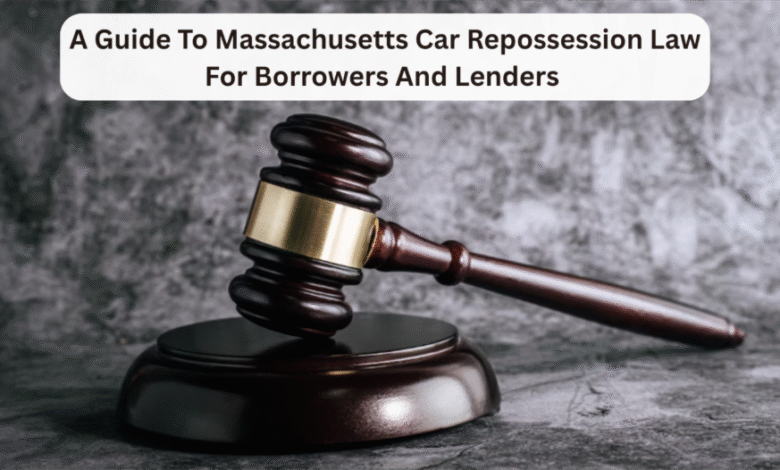A Guide To Massachusetts Car Repossession Law For Borrowers And Lenders

Car repossession occurs when a lending company reclaims a vehicle issued to a borrower who has defaulted. Nevertheless, repossession is a legally sensitive procedure that is based on a set of strict regulations to safeguard both lenders and borrowers.
Especially, laws about car repossession in Massachusetts are meant to guarantee that lenders act according to best practices and allow borrowers to reclaim defaults and avoid vehicle confiscation.
Such a law is important because, for borrowers, repossession can create severe interruptions to everyday life, making it difficult to go about their day-to-day activities. Moreover, to the lenders, ill-managed repossessions may cause costly legal battles, fines, and tarnish their image.
So, as a borrower facing financial difficulties or a lender seeking to repossess a vehicle, it is important to know the Massachusetts repossession laws.
This guide will guide you through this legal process, safeguard your rights, and help you avoid mistakes that could be costly.
Lender Obligations Prior to Repossession
Lenders are obligated by Massachusetts car repossession law to perform an important task before repossessing an automobile:
Right to Cure Notice

Before initiating a repossession procedure, the lender must issue the borrower a Right to Cure notice. The notice will inform the borrower that they are in default and provide them with time to solve this issue—most commonly through payment of the due amount—within 21 days.
Also, the notice should contain-
- The precise sum that is due for payment to cure the default.
- Instructions for curing the default.
- A provision to the effect that, if default is not dissolved, repossession shall be exercised. However, if the borrower cures the default within the period specified, the lender shall not resort to repossession.
Legal Requirements of Lenders
If the borrower does not cure the default within 21 days, the lender has the legal right to repossess the car. But they must also comply with very strict legal requirements in the repossession process:
1. No Breach of Peace
Repossession agents or lenders must repossess the car without causing a breach of the peace or disturbance. That means, they must not:
- Use threat, intimidation, or force.
- Force open locked garages or secured private property without consent.
- Resort to physical confrontations with the borrower or third parties.
If these measures are not followed, repossession involving a breach of peace can be considered illegal and put the lender at risk of liability.
2. Post-Repossession Notice
Within three business days of repossession of the vehicle, the lender is required to send a Post-Repossession Notice. This notice will state:
- The borrower’s ability to redeem (purchase) the vehicle
- Details about possible deficiency balances if the sale won’t cover the full loan amount
- The amount of redemption due
- Specified date and manner of the proposed sale of the vehicle (public sale or private sale)
Borrower Rights After Repossession
Repossession is not the end of a borrower’s legal rights—contrarily, there are a few key rights that protect borrowers once their automobile has been repossessed.
1. Right to Redeem the Vehicle

Despite repossession, Massachusetts borrowers are entitled to redeem their vehicle by paying the total amount of outstanding loan plus any associated repossession fees, storage charges, and other such expenses before the vehicle is sold.
Hence, this right affords them a last opportunity to recover their vehicle and avoid subsequent financial losses. But remember, redemption has to be made prior to the sale date. That means the sooner, the better.
Moreover, a Massachusetts auto repossession attorney can advise you about the total redemption price and negotiation periods with the lender.
2. Right to a Commercially Reasonable Sale
Massachusetts statute requires lenders to dispose of repossessed cars in a “commercially reasonable” manner. That means the lender will exercise good faith in marketing the car, achieving fair market value, and selling the car on reasonable terms.
On that note, borrowers have a right to dispute the actions of the lender if the lender rushes the sale, fails to market the vehicle properly, or sells it at a poor price.
It is an important right because an undervalued sale can affect the borrower’s deficiency balance considerably. Not only that, a proper litigation may also eliminate the outstanding debt if wrongful sale procedures are found.
3. Right to Be Sent a Deficiency Notice
When the sale of the car does not pay the amount owing on the loan, Massachusetts lenders can seek from the borrower the remaining balance. But they are also legislatively required to give a valid deficiency notice stating shortfalls.
The notice must contain the amount still owing and explain how the proceeds of the sale of the vehicle were distributed. It should also specify that the sale was conducted in a commercially reasonable manner.
This way, borrowers can argue the improperly calculated deficiencies, especially when the lender is unable to comply with proper notice and sale requirements.
Conclusion
Navigating car repossession in Massachusetts is challenging, but understanding your rights and the legal process can make all the difference. Whether you’re a borrower striving to protect your vehicle or a lender seeking to recover assets lawfully, knowledge is your strongest defense.
That said, Massachusetts law strikes a balance between creditor rights and consumer protections, but mistakes on either side can lead to costly consequences. Therefore, by staying informed and seeking legal guidance when needed, both borrowers and lenders can resolve repossession matters fairly and efficiently.
After all, informed decisions today can prevent legal disputes tomorrow.




